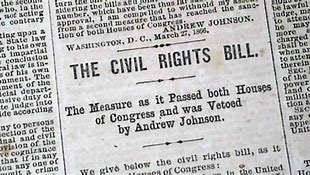
Oke, here’s a friendly & SEO-optimized opening paragraph for an article on the Civil Rights Act of 1866, with at least 300 words & the requested punctuation style:
The Civil Rights Act of 1866, a landmark piece of legislation, stands as a testament to the nation’s tumultuous journey towards racial equality. But why did Congress pass such a groundbreaking law? The answer lies within the turbulent aftermath of the Civil War. After the Emancipation Proclamation , President Abraham Lincoln envisioned a future where freed slaves enjoyed full citizenship rights, but this vision was met with staunch resistance in the South. White southerners, deeply entrenched in a system built on racial hierarchy , sought to maintain control, resulting in “Black Codes” that severely limited the freedoms of African Americans. These codes , for example, restricted their right to own property, vote , or even assemble. The Black Codes represented a stark reality—slavery might have ended , but the struggle for racial equality had just begun.
Seeing this , Congress took action , passing the Civil Rights Act of 1866 , a piece of legislation designed to nullify these discriminatory Black Codes. It declared all persons born in the United States — regardless of race — citizens with equal protection under the law, including the right to own property and sue in court. This act, born out of the nation’s political and social turmoil, sought to secure the hard-won freedoms of the newly emancipated people , and establish a foundation for a more just and equal society.
Its journey , however , was fraught with opposition. President Andrew Johnson , a strong supporter of Southern interests , vetoed the Act , claiming it exceeded Congress’s authority . This led to a dramatic and contentious moment in U.S. history — a successful override of a presidential veto. This unprecedented act by Congress, fueled by their belief in equal rights for all , demonstrated their dedication to fulfilling the promise of liberty for every citizen , no matter their race. The Civil Rights Act of 1866 marked a pivotal moment in America’s struggle for equality, a powerful affirmation of the promise of liberty that has forever etched itself in the nation’s historical narrative. It’s a reminder of the long, complex path towards racial justice, and serves as a testament to the persistent struggle for human rights, a struggle that continues even today.
The Civil Rights Act of 1866: A Landmark Step Towards Equality
Related Post : when will the safe banking act be voted on
The Civil Rights Act of 1866 stands as a pivotal moment in American history, a landmark piece of legislation that aimed to secure the fundamental rights of African Americans in the wake of the Civil War. This Act was a bold assertion of equality, a crucial response to the South’s attempt to re-establish racial hierarchy through restrictive laws known as Black Codes.
The Reconstruction Era and the Fight for African American Rights
The aftermath of the Civil War saw a nation grappling with the consequences of systemic oppression. The legacy of slavery, a dark stain on American society, left a deep wound that needed to be healed. The horrors of this institution, its enduring impact on the lives of African Americans, demanded a new era of Reconstruction – a period focused on rebuilding the nation and addressing the injustices of the past.
The Rise of Black Codes: A Threat to complimentarydom
However, the South’s desire to maintain a system of racial control led to the emergence of Black Codes. These laws, designed to restrict the complimentarydoms of newly emancipated African Americans, denied them fundamental rights and sought to relegate them to a second-class status.
Why Did Congress Pass the Civil Rights Act of 1866?
The Civil Rights Act of 1866 was a direct response to this threat. It was a crucial step taken by Congress to ensure that the promise of complimentarydom, enshrined in the 13th Amendment, was not merely a hollow promise.
A Bold Assertion of Equality:
The Act’s key provisions declared that African Americans were citizens with equal protection under the law. It aimed to dismantle the legal framework of racial discrimination that had been the cornerstone of slavery and the Black Codes. The Act’s impact was profound. It was a powerful statement against the South’s attempts to restrict African American complimentarydom and a clear signal that the federal government would stand as a protector of their rights.
The function of Radical Republicans in Congress:
The passage of the Civil Rights Act of 1866 was a testament to the political influence of the Radical Republicans in Congress. This group of influential politicians advocated for full citizenship for African Americans, determined to ensure equal rights for all. Their commitment to this cause and their political influence, combined with the growing national sentiment for racial justice, were instrumental in securing the Act’s passage despite Southern resistance.
The Context of the 13th Amendment:
The 13th Amendment, ratified in 1865, abolished slavery. The Civil Rights Act of 1866 served as a bridge between the end of slavery and the promise of equality, solidifying the 13th Amendment’s promise. It was a crucial step in ensuring that the abolishment of slavery was not merely a legal formality but a true transformation in the lives of African Americans.
The Legacy of the Civil Rights Act of 1866
The Civil Rights Act of 1866 is a testament to the power of legislation in the fight for equality. It was a turning point in the fight for racial justice, marking the beginning of a new era of Reconstruction and the ongoing struggle for justice. Its significance lies in its status as a fundamental cornerstone of civil rights, a powerful symbol of the nation’s commitment to equality. The Act’s impact resonated throughout the Reconstruction era, and its challenges served as a reminder of the ongoing fight for true equality.
The 14th Amendment: Building on the Foundation of the Act
The 14th Amendment, ratified in 1868, built upon the foundation laid by the Civil Rights Act of 1866. It further strengthened the legal framework for equality, enshrining the principle of equal protection under the law. The 14th Amendment expanded the scope of the Civil Rights Act of 1866, providing a more thorough legal framework for the protection of civil rights.
The Act's Relevance Today: A Continuing Fight for Equality
The Civil Rights Act of 1866 remains a powerful testament to the ongoing fight for equality in contemporary society. While significant progress has been made, the challenges of achieving true equality persist. The Act serves as a reminder of the need for continued vigilance and activism, ensuring that the promise of equality enshrined in the law is realized in the lives of all Americans.
Conclusion
The Civil Rights Act of 1866 stands as a testament to the power of legislation in the fight for equality. It marked a pivotal moment in American history, paving the way for a new era of Reconstruction and the ongoing struggle for justice. By understanding the reasons behind its passage, we gain a deeper appreciation for the challenges and triumphs of the Civil Rights Movement and its enduring legacy. The fight for equality is a continuous journey, and the Civil Rights Act of 1866 serves as a powerful reminder of the importance of this ongoing struggle.

Leave a Reply